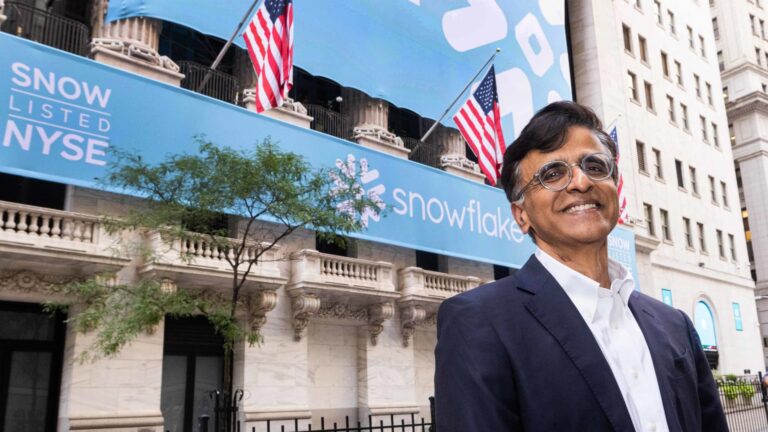The CEO of AI data firm Snowflake isn’t letting the stock market distract him from ambitions to become “one of the great technology companies in this world,” he told CNBC.
The company — a cloud data storage platform — made history when it became the largest-ever software IPO when it went public five years ago, and its share price is currently rallying amid an AI boom.
However, as investors flock to AI-related companies, fears of a bubble have emerged, leaving the market keen to distinguish between hype and reality in a bid to avoid being burned in the event of a pull-back.
“You don’t control the stock price,” Sridhar Ramaswamy told “Squawk Box Europe” on Thursday. Shares of Snowflake rose 6.5% on Wednesday and are up over 60% year-to-date.

“My focus very much is on value creation. We have to earn dollars, every single dollar at a time, so we are focused on the quarter, focused on the year, but, much more, also on the value that we create with customers, or the long term, the stock market will settle itself,” he added.
His comments came after Snowflake investor Michael Speiser last week sold shares to net over $11 million, while senior VP Vivek Raghu Nathan made around $2.6 million in a share sale at the end of last month.
Ramaswamy declined to comment on individuals’ sales but added: “I am not selling any stock, I’m very much in favor of the long-term value that Snowflake is going to be creating, and the sales tend to be very, very modest.”
Toeing the line of incremental adoption
Ramaswamy said it was important for firms to keep their eyes on the prize — making AI useful and building returns that way — and advised customers to do the same.
He stressed the importance of implementing AI incrementally, in part because not all projects will work, but also because employees fearing that AI will replace them may be resistant.
“That’s part of the nuance that executives need to bring in to figure out: Where is the technology most applicable? Some are thinking of AI as a technology that can cure all problems. I think it’s a mistake. Definitely, there’s promise, but some areas are going to be much more amenable than others,” Ramaswamy said.
One key opportunity right now is how quickly AI can accelerate the value that comes from data, Ramaswamy said.
“The time-to-value change is also pretty remarkable. Will there be turbulence along the way in the markets, with respect to how the stock market behaves? Absolutely. But I think the value that is going to come out of this AI revolution, if I may call it that, is pretty firm, and we all need to stay focused on that,” he added.
A market bubble — and burst — doesn’t have to mean the end of a company. Meta, Amazon and Google all emerged from the dot-com era and are among the world’s most valuable companies today.

But AI might not necessarily play out in the same way as the dot-com bubble, according to Vista Equity’s Ashley MacNeill, especially if investors keep a cool head, While bullish, she told CNBC’s “Closing Bell” that it’s important to have a “measured” approach.
“Is this a bubble that’s going to burst like it did in 1999? Or is this more like a balloon where we’re going to see it inflate and deflate as we go through the cycles?” MacNeill said.
“Given the longevity of this technology and given the fact this is waves that’s going to adopt this technology, I’m more inclined to think that we aren’t bursting, but rather we’re going to inflate and deflate as this technology ebbs and flows,” she added.

